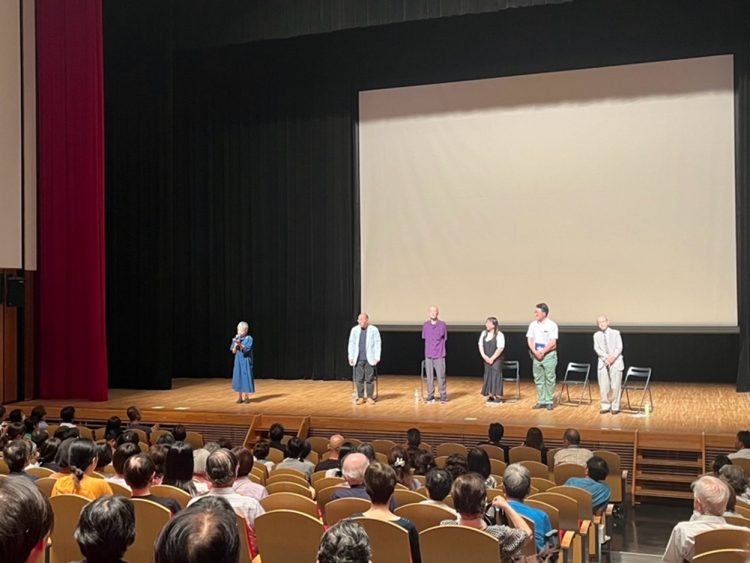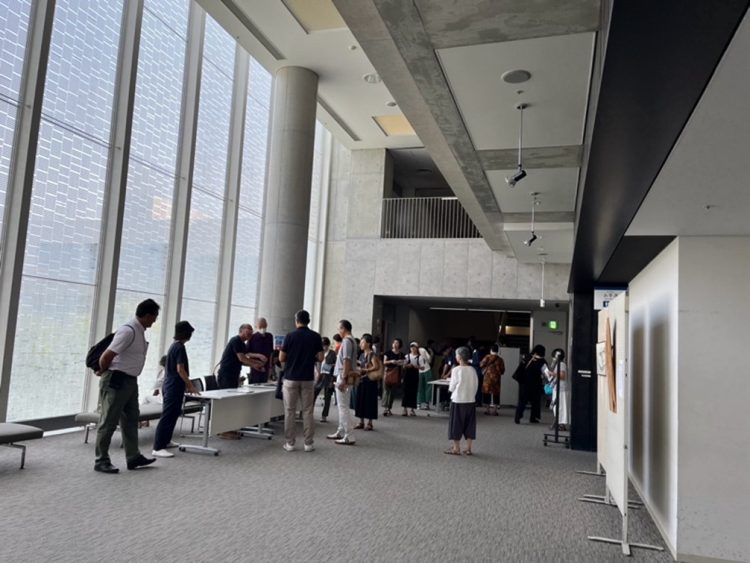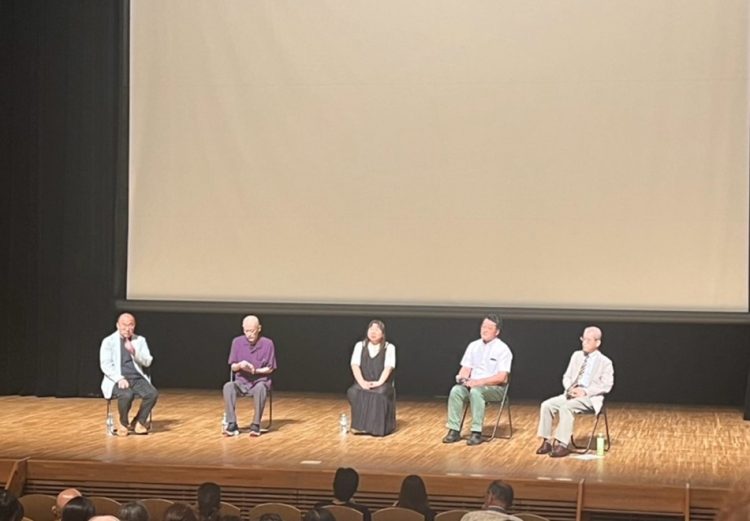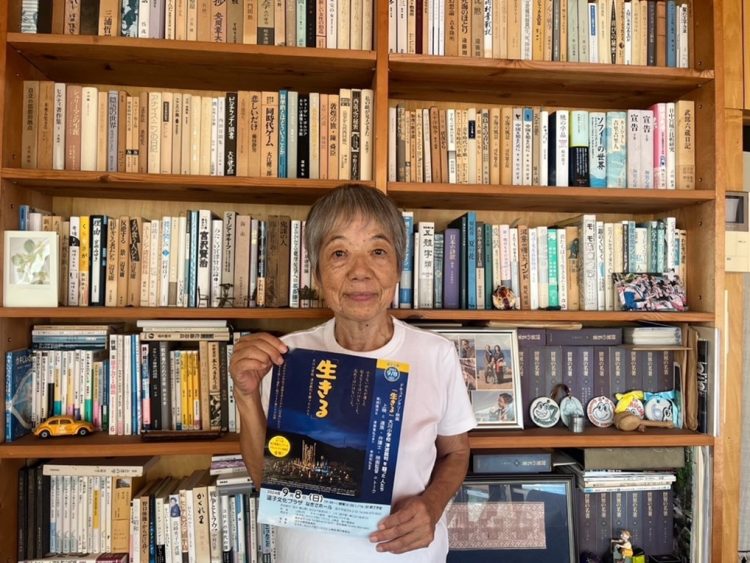Connecting memories: Courage found at the film screening of parents’ legal battle after the Great East Japan Earthquake Tsunami InsightsEssays: Civil Society in Japan
Posted on December 16, 2024
Japan NPO Center (JNPOC) has a news & commentary site called NPO CROSS that discusses the role of NPOs/NGOs and civil society as well as social issues in Japan and abroad. We post articles contributed by various stakeholders, including NPOs, foundations, corporations, and volunteer writers.
For this JNPOC’s English site, we select some translated articles from NPO CROSS to introduce to our English-speaking readers.
Connecting memories: Courage found at the film screening of parents’ legal battle after the Great East Japan Earthquake Tsunami

During the Great East Japan Earthquake in 2011, 74 students (4 of whom are still missing) and 10 teachers at Okawa Elementary School in Ishinomaki City, Miyagi Prefecture, lost their lives after being swept away by the tsunami. Despite a major tsunami warning, the school remained in the schoolyard for 50 minutes after the earthquake and did not evacuate to the higher ground behind the school, which has been identified as a significant issue.
A documentary film titled ‘To Live’ People Who Fought for the Okawa Elementary School Tsunami Trial, which covers this incident, was screened at the Zushi Cultural Plaza in Kanagawa Prefecture on September 8, 2024. Following the screening, a talk event featuring the bereaved families, lawyers, and the film’s director was held.
In this article, I introduce the event and share the story of Teiko Fujiwara, the initiator of this independent screening.
Film ‘To Live’ People Who Fought for the Okawa Elementary School Tsunami Trial
This tragedy unfolded at an elementary school, a place intended to protect children. After the disaster, explanations about the incident were provided during a parents’ briefing held by the Ishinomaki City Board of Education and in an investigation report by a third-party panel of disaster prevention and education experts.
However, the film reveals that the bereaved families’ voices were consistently marginalized during these meetings. Despite their desperate search for answers regarding the circumstances of their children’s deaths, they were denied the truth. The decision to end the parents’ briefings and the investigation was made unilaterally, forcing the bereaved families to seek justice through a lawsuit against the state.
This film captures the period from the earthquake to the appeal trial, focusing on the bereaved families and their lawyers, Mr. Yoshioka and Mr. Saito.
A decade of records captivating 500 people

At the Lobby on the Day of the Screening
The screening and talk event drew a full house of about 500 attendees; the audience was diverse in age, including young people around middle and high school age.
Before the screening, Ms. Fujiwara, the event’s initiator, delivered a speech.
“People want to forget painful memories to have a peaceful everyday life. But deep down, we also know we shouldn’t forget. It takes courage to watch a movie knowing it will be painful, to spend time and money on such an experience. It’s amazing that so many people do that. And the families who lost loved ones, they have been through so much more pain. They are incredibly brave to talk about their experiences in front of a big audience, traveling all the way from Ishinomaki to Zushi. They are far braver than any of us. This whole place is full of brave people.”
The words held the audience captive. The film delves into the interactions between Okawa Elementary School and Ishinomaki City Board of Education immediately after the disaster, the activities of the investigation committee, and the national compensation lawsuit, interspersed with interviews of bereaved families and lawyers. A palpable tension filled the theater as viewers were drawn into the narrative.
Talk event: Exploring memory and regeneration through film

Following the film screening, director Kazuhiro Terada, along with bereaved family members Hiroyuki and Hitomi Konno, Takayasu Shito, and attorney Masahiro Saito, took to the stage to share their thoughts.
Director Terada hosted a talk event following the film screening. The first half featured discussions by the panelists, while the second half was dedicated to a Q&A session with the audience.
The five panelists shared details that were not covered in the film.
Mr. Hiroyuki Konno, for instance, revealed how the plaintiff group, despite facing additional financial burdens for the appeal, remained united and supported each other. Their unwavering determination to seek justice was evident, making their story far more profound than a simple heartwarming tale.
While sharing a personal story about her son Daisuke, who was in the sixth grade at the time, Ms. Hitomi Konno also highlighted the insufficient support provided for the mental health of the surviving children. She emphasized that the emotional healing of those left behind is far from complete.
Mr. Shito, a former firefighter in Ishinomaki, shared a vivid account of the tsunami that devastated Okawa Elementary School, drawing on both his personal experiences and his knowledge as a first responder. He underscored the critical importance of being personally prepared for earthquakes. While admitting that sharing his daughter’s story is emotionally challenging, he explained that it serves as a way to honor her memory. Alongside Mr. Konno, he passionately advocated for disaster preparedness, expressing his heartfelt wish that no one else should suffer such a tragic loss.
The lawyer, Mr. Saito, described the challenges of collecting evidence and testimonies from parents outside the plaintiff group, especially considering the devastating loss caused by the tsunami. The lawyer explained how working alongside the bereaved families deepened his understanding of their resilience and determination, inspiring him to fight for their cause.
In the presence of the bereaved families portrayed in the film, the audience felt a heightened sense of tension as they sought to fully grasp the strength of their emotions.
A bond forged through teaching experience and film: An interview with Ms. Fujiwara

Ms. Teiko Fujiwara, the initiator of the screening event
I recently had the chance to speak with Ms. Teiko Fujiwara, the initiator of this event. A longtime educator, Ms. Fujiwara attended a screening of the film in Yokosuka this past April. The film deeply moved her, bringing her to tears. She shared that her experiences as a teacher had significantly influenced her emotional response. A past tragedy, involving the loss of a student in a drowning accident, made the film particularly resonant for her.
Many people tend to avoid painful memories. However, Ms. Fujiwara believed that ignoring them could cause additional suffering for bereaved families. Driven by a sense of mission, she wanted to share the film with a wider audience, particularly educators. After careful consideration, she determined that hosting independent screenings was the most effective way to achieve this goal.
When I asked Ms. Fujiwara about the members of the independent screening committee, she laughed warmly and replied, “We like to call it a ‘committee,’ but it really started with me reaching out to people I knew, and the group just grew from there.”
As she said, this event was a collaborative effort involving a wide network of people Ms. Fujiwara connected with. From her zazen group and art class to her high school alumni and former students, and even members of the “16mm Screening Room” that hosted a screening in Yokosuka, many came together to support this project. Ms. Fujiwara personally appealed to each individual, occasionally with tears in her eyes, sharing her passion for the film. Looking back, she said, “It was my heartfelt desire that inspired everyone to get involved.”
The support members were incredibly diverse. There was a tech-savvy individual who handled public relations, friends who contributed financially, and former students who sold tickets at their family’s restaurant. Ms. Fujiwara herself was actively involved, giving speeches at local schools and securing coverage in the local newspaper. The support and enthusiasm of her team were the driving force behind her efforts. She reflected, “I feel like I’ve been on a journey to involve everyone I meet, and I think this is what true community engagement is all about.”
When I interviewed Ms. Fujiwara before the event, she mentioned that selling tickets to a wider audience was a challenge. However, on the day of the event, a “Sold Out” sign greeted attendees at the entrance. When asked about the successful ticket sales, she attributed it to the personal connections she had made with potential attendees. “I believe that the victims’ firsthand accounts and personal communication played a significant role in drawing such a large crowd,” she said.
Ms. Fujiwara had anticipated the audience’s reaction to the film and how the voices of the bereaved families would resonate. The response, however, was overwhelmingly positive, far exceeding her expectations. The film screening survey had a high return rate, with many people providing detailed feedback. Some even sent follow-up emails, stating there was too much to write in the survey alone.
I want as many people as possible to know about this so that no life is lost in vain.
From the audience’s feedback on the day, Ms. Fujiwara realized that many people shared her desire to make a positive impact on the world. Her journey began when she first saw the film in Yokosuka. Drawing on her experience as a teacher, she felt a strong calling to share the story of Okawa Elementary School with a wider audience.
The bereaved families are still grappling with this reality, and it is a battle that never ends. It is not as simple as calling it a tragedy or blaming inadequate responses. To ensure that the children’s deaths were not in vain, they chose to document the facts on film. By watching the film, it is as if the children are living again. Fujiwara passionately expressed that the film is about people who choose to “live” even as they confront harsh realities they cannot accept. She emphasized that it is a work that serves as an inspiration for us to keep moving forward.
When I asked about future screenings, Ms. Fujiwara replied, “I’m not sure about that right now. There was something special about this being a one-time event.” She paused, then added with a smile, “But I’ve had a lot of requests to do it again.” With her strong determination and the support of her dedicated team, I am confident that Ms. Fujiwara will continue to inspire others.
Original text by Anna Kitahara (JNPOC volunteer writer) originally posted on October 18, 2024; translated by JNPOC.
Recent Articles
- How are NPO support centers balancing staff protection and abusive behavior?: Strategies for managing customer harassment
- A view on realignment in U.S. private philanthropy
- Adapting global goals to local action: The SAVE JAPAN Project approach
- Japanese Translation Available: CAPS Report on Age-Friendly Societies in Asia
- JNPOC and Dentsu’s “Qadai Lab” Launches Column in Forbes Japan
- JNPOC published Report on IT Utilization Survey for Nonprofit Organizations 2025